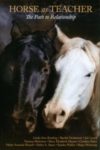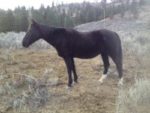Spring Grass and Pro-Biotics
by Marijke van de Water, B.Sc., DHMS
Spring Grass and Probiotics

One of my mares has a problem in the spring transitioning from hay to grass. The rest of the herd seems okay but she becomes bloated, gets a little colicky and doesn’t seem quite right. Is there anything I can do to help her?
Digestive problems in horses going from a hay diet to a grass diet indicate that they are not efficiently fermenting the fibre or the sugar from the grass. In a healthy equine digestive system, starches and sugars should be digested in the stomach and small intestine (foregut), with very few of these starches ending up in the cecum (hindgut) for fermentation.
The only food group that should be fermented in the cecum is fibre, from where horses get most of their energy. However, excess dietary starches/sugars from grain and/or grass cannot normally be completely digested in the foregut and must then be fermented in the cecum. Excess cecal fermentation of sugar and starch causes gas, bloating, colic, acid build-up and eventually leaky gut and laminitis.
As well, a horse on the new spring grass is not yet digesting everything completely in the foregut, therefore a larger than normal volume of mal-digested feed material needs to be fermented in the cecum.
Because hay and grass differ in sugar, starch and moisture content they each require different species of fermentative bacteria. This is why a horse’s diet must always be changed over slowly, so that the friendly bacteria (probiotics) in the hindgut have time to adapt.
For this reason, and for most horses, a grass diet must be introduced slowly and gradually increased. This might even mean starting at one-half hour to begin with and increasing by ten or fifteen minute increments per day, depending on the sensitivity of the horse.
Despite a gradual introduction however, some horses will still exhibit symptoms indicating that they are low in probiotics. The process of fermentation is accomplished with billions of units of various strains of bacteria. Horses, perhaps more than any other species, rely on this healthy count of probiotics to maintain a balanced ecosystem in the gut.
A deficiency of probiotics can cause bloating, colic, diarrhea, leaky gut, bacteria and yeast infections, poor immunity, unhealthy weight loss or gain and/or vitamin deficiencies.
Introduce grass to your horse slowly and give ¼ tsp of the Riva’s Pro-Colon, which is a blend of probiotics formulated specifically for horses. Use Gastricol once or twice daily to keep bloating and fermentation problems to a minimum.
Gastricol is a combination of homeopathic remedies for bloating, gas, colic and liver toxicity. Bear in mind that some horses must be kept off the grass completely until their digestion is improved.
——————————————–
About Marijke
Marijke van de Water, B.Sc., DHMS is an Equine Health & Nutrition Specialist, Homeopathic Practitioner and Medical Intuitive who has a natural health practice for horses (and their people). She is the author of “Healing Horses: Their Way!” and the founder of Riva’s Remedies, a natural health product line for horses.
Visit www.rivasremedies.com for more info.


